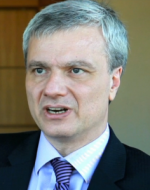
Peter Canellos
Boston Globe editorial-page editor Peter Canellos, a former metro editor and Washington bureau chief for the paper, is leaving. According to a press release issued earlier today, Canellos will depart after 26 years at the Globe. He is also an alumnus of The Boston Phoenix.
Canellos will be replaced on an interim basis by Ellen Clegg, a former newsroom editor who is currently executive director of communication and president of the Boston Globe Foundation.
Here is Globe reporter Beth Healy’s story on Canellos’ departure.
The timing is especially interesting given that we are in the midst of endorsement season. Though the Globe is a staunchly liberal paper, the opinion pages have shown a penchant over the years for endorsing the occasional moderate Republican. Already I’ve heard speculation that the Globe might endorse Republican gubernatorial candidate Charlie Baker over Democrat Martha Coakley. Presumably the paper’s owner/publisher, John Henry, will have the final word.
Canellos has long had a reputation for being one of the more cerebral journalists at 135 Morrissey Blvd. He oversaw the Sunday Ideas section as well as the opinion pages. In my dealings with him over the years I have always found him to be decent and thoughtful.
According to Craig Douglas of the Boston Business Journal, Canellos took an employee-buyout offer made earlier this summer. Also leaving, Douglas reports, is Kyle Alspach, a tech reporter for the Globe’s innovation site, BetaBoston. Alspach is going to work in a national position for Streetwise Media, which publishes the local site BostInno and which shares a common owner with the BBJ.
Here is an email from Canellos to the staff, a copy of which I obtained earlier today:
It’s been more than 26 years since I walked into the Globe newsroom to meet the then-Metro editor, our own David Scharfenberg’s brilliant father, Kirk. At the time, I could barely envision the breathtaking array of adventures to come. Now, more than half my life later, I will finish my Globe career as editorial page editor. It’s a perfect time, personally and professionally, to pursue exciting new opportunities. But it’s a tribute to all of you that it took me so long to prepare for another chapter.
At a time like this, it’s natural to think of all the editors, starting with the never-forgotten Kirk, who nurtured and encouraged me. There are too many to name, but all are in my thoughts. For a long time, though, I’ve had the honor of being an editor myself. And my own strength and inspiration, day in and day out, has come from the writers and fellow editors with whom I’ve worked over the past 15 years. During that time, I’ve had the unique privilege of holding three entirely different portfolios, from Metro to the Washington bureau to the opinion pages. And I owe all my satisfaction to the stimulating interactions with colleagues in all three departments.
Over the years, I’ve urged many Globe writers to consider doing stints as editors, on these grounds: It gives you a chance to look at the journalistic endeavor with fresh eyes; and it turns what can feel like a solitary and sometimes nerve-wracking process of creating great journalism into a truly collaborative experience.
Now, looking back over the years, it’s all those collaborations that I remember. I can see the people more clearly than the stories. All those days and nights talking through ideas, matching wits behind the keyboard, and then nervously watching the product take shape were meaningful because of the sense of shared creation.
Those stories live on, but so too do the relationships. Having shifted seats a few times, I’ve learned that the great reward at the end of any editing tenure is that colleagues can finally become friends. The breaking of the professional bond is only the start of an even more rewarding personal one. So it was when I left my previous two posts. So it will be again. I can only say how grateful I have been for these opportunities, and how happy I am in knowing — without any doubt — that while the work may end, the friendships will continue to grow. Thank you,
Peter
And here is the Globe’s press release announcing Canellos’ departure and Clegg’s new responsibilities:
Boston (September 15, 2014) – Boston Globe Media Partners today announced a change in leadership of its editorial and opinion pages. Peter Canellos is leaving his job as editorial page editor after five years in the role and 26 years at the Globe.
“It’s been more than 26 years since I walked into the Globe newsroom to meet the then-Metro editor, our own David Scharfenberg’s brilliant father, Kirk. At the time, I could barely envision the breathtaking array of adventures to come,” Canellos said. “Now, more than half my life later, I will finish my Globe career as editorial page editor. It’s a perfect time, personally and professionally, to pursue exciting new opportunities.”
Canellos was responsible for the paper’s editorial and op-ed pages, and Sunday Ideas section. As the head of the editorial board, he has played the leading role in crafting the paper’s positions on local, national, and foreign issues. During his tenure as editorial page editor, two writers were named finalists for the Pulitzer Prize: in 2013, columnist Juliette Kayyem was nominated as finalist for commentary, and this year deputy managing editor Dante Ramos was named a finalist for editorial writing.
“Peter is a singular talent, and we are extraordinarily thankful for the years he devoted to the Globe,” said John Henry, Globe owner and publisher. “He is a master storyteller, deep thinker and adept communicator.”
Ellen Clegg, who spent 30 years in the Globe’s newsroom and is now executive director of communication and president of the Boston Globe Foundation, will serve as interim editorial page editor. In the newsroom, she served as deputy managing editor for news operations; deputy managing editor for the Boston Sunday Globe; assistant managing editor for regional news; city editor, and specialist editor, where she oversaw reporting on health and science, religion, education, and ideas. In between stints at the Globe, she was a science writer at the Broad Institute of MIT and Harvard. She is the author of “ChemoBrain,” which was named consumer health book of the year by the American Journal of Nursing, and co-author of “The Alzheimer’s Solution.”
Henry has pledged that the Globe will continue to challenge convention and rethink the presentation of its opinion and editorial pages for the digital age.
“Our content, whether news, sports, entertainment or editorial, must be presented in formats that engage the broadest range of readers, wherever they are in the world and however they are reading the Globe,” said Henry.
Prior to becoming editorial page editor, Canellos was chief of the Globe’s Washington bureau, where he led the Globe’s bureau in its coverage of the 2004 and 2008 presidential campaigns and the insurgency in Iraq, among many other major issues. During his tenure the Globe’s bureau won numerous awards, including the Pulitzer Prize for national reporting.
In 2011, Canellos won a distinguished writing award from the American Society of News Editors.
Canellos also oversaw the development of the Globe’s best-selling biography “Last Lion: The Fall and Rise of Ted Kennedy,” which reached number seven on the New York Times best-seller list.
He began working for the Globe in 1988, covering housing and urban affairs.
From 1999 to 2003, he was assistant managing editor for local news, overseeing all news coverage of the city and the region.


